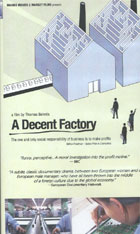
A Decent Factory 2004
Distributed by First Run/Icarus Films, 32 Court St., 21st Floor, Brooklyn, NY 11201; 800-876-1710
Produced by Thomas Balmés
Directed by Thomas Balmés
VHS, color, 79 min.
College - Adult
Business, Ethics, Labor Relations
Date Entered: 08/09/2005
Reviewed by Ramona Islam, DiMenna-Nyselius Library, Fairfield UniversityThe opening and closing scenes in this documentary film strike a glaring contrast between the regimented lives of Chinese factory workers and the relative insouciance enjoyed by Western business people. While his approach is subtle, it seems that filmmaker Thomas Balmés is hoping we’ll notice the irony: Nokia capitalists who benefit from cheap Chinese labor are on a mission to investigate labor law violations at an electronics factory that supplies the Finnish corporation. As executives prepare to embark on this project, one among them asks “How much are we really trying to change the world to be a better place in those kind of countries?” to which a blunt businessman remarks [sic], “Do we want to make illusion that we are clean and really be able to send press release PR type of communication and say we are clean?”
The impetus for Nokia’s mission, articulated by the company’s Ethics and Environmental Specialist Hanna Kaskinen, is a new breed of investment company focused on environmentally conscious, ethical funds. Analysts representing such funds monitor companies like Nokia for compliance with moral labor standards. This brings Ms. Kaskinen and British ethics consultant Louise Jamison, trailed by filmmaker Balmés, to a factory in China. Despite the presence of an English factory manager, they uncover numerous (though unsurprising) violations and questionable practices: hazardous chemicals stored near food and drinking water, payment below the minimum wage, no employment contracts, mandatory overtime, exposure to extremely hot equipment, and forced participation, through payroll deduction, in the factory’s room and board system. Bunking eight women together, dormitories seem akin to prison cells, even while posters glorifying Chinese movie stars hint that the inhabitants might dream of a better life.
This is not the film for a person who wants to learn how globalization affects workers, whether low-cost laborers in China or their now jobless counterparts in the west. Cursory interviews with factory employees do not reveal anything profound, other than one Chinese manager’s profound resistance to allowing the meetings to take place out of his earshot. Unique compared to other exposés, Balmés’ documentary functions as a case study of Nokia and one Chinese factory, yet it does not entirely ignore the wider context. Rather than providing answers or solutions, he asks an uncomfortable question: can Western executives in a globalized world cling to ideals realized by the labor movement, or must they become cogs in a giant machine, alongside the factory workers they inevitably exploit?
Aside from its philosophical bent, A Decent Factory offers a practical look at how ethics consultants conduct themselves behind the scenes. This documentary is recommended for use in the classroom, especially for college courses in business ethics.